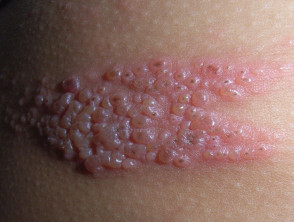What Does My HPV Test Result Mean?
The HPV Test
Checks your cervix for the papillomavirus (HPV) that can cause abnormal cells and cervical cancer.
Your HPV test will come back as either “positive” or “negative.”
- A negative HPV test means you do not have an papillomavirus (HPV) type that is linked to cervical cancer.
- A positive papillomavirus (HPV) test means you do have an HPV type that may be linked to cervical cancer. This probably does not mean you have cervical cancer now. But it could be a warning.
HPV test results are only meaningful WITH your Pap test results. To understand what these tests mean together:
If your HPV test is negative (normal) and your...
Pap test is Normal
This means:
- You are very unlikely to have papillomavirus (HPV) in your cervix.
- Your cervical cells are normal.
- You have a very low chance of getting cervical cancer in the next few years.
You should:
- Wait 3 years before being tested again.
- Ask your doctor when to come in for your next visit.
- Experts used to suggest yearly Pap tests. But now you can safely wait longer to have the HPV test with your Pap test
If your HPV test is negative (normal) and your...
Pap test is Unclear (ASC-US)
This means
- You do not have papillomavirus (HPV), but your Pap test was unclear.
- Even if you do have cell changes, it is unlikely that they are caused by papillomavirus (HPV).
You should
Get another Pap test in a year just to be sure.
If your HPV test is negative (normal) and your...
Pap test is Abnormal
This means
- Your Pap test found abnormal cells.
- Your HPV test did not find papillomavirus (HPV).
It’s important to find out why the two tests are showing different things.
Your doctor may
- Take a closer look at your cervix (i.e. colposcopy) to find out if your cells are abnormal and/or treat you right away.
If your HPV test is Positive (abnormal) and your...
Pap test is Normal
This means
- Your cervical cells are normal, but you have HPV.
- You may fight off papillomavirus (HPV) naturally and never get cell changes. Or, you may not fight off HPV, and HPV could cause cell changes in the future.
- Most women fight off HPV within 2 years. It is not known why most women fight off HPV and some do not.
You should
Get another Pap and HPV test in 1 year.
Cell changes happen slowly. Some time must pass before your doctor can tell if HPV will go away or cause cell changes.
If your HPV test is negative (normal) and your...
Pap test is Unclear (ASC-US)
This means
- You have HPV, but your Pap test was unclear.
Your doctor will
- Take a closer look at your cervix to find out if your cells are abnormal.
- Your doctor may need to either remove the abnormal cells or monitor them to make sure they do not get worse.
If your HPV test is Positive (abnormal) and your...
Pap test is Abnormal
This means
- You have HPV.
- Your cervical cells are abnormal.
- This does not usually mean you have cancer.
Your doctor will
- Take a closer look at your cervix (i.e. colposcopy) to find out if your cells are abnormal and how serious the cell changes are.
- Your doctor may need to remove the abnormal cells to make sure they do not get worse.
When to screen
Your results on the HPV test and Pap test will tell your doctor how long it is safe for you to wait before getting screened again.
Remember if you have a normal Pap test and a negative HPV test, it is safe to wait 3 years until your next cervical cancer screening exam.
If I have HPV, do I have cervical cancer?
No, HPV is not the same as cervical cancer. HPV is the virus that can cause cervical cancer. Many women have HPV. Few of them get cervical cancer if they follow their doctor’s advice for more testing and/or treatment.
What will happen if I need to come back for more testing?
Your doctor will do what’s right for you, based on your test results. Your doctor may
- Ask you to wait several months before redoing the Pap and/or HPV test. This is called “watchful waiting.” It is common.
- Take a closer look at your cervix. This is done using a special lens that makes your cervix look bigger (called a colposcopy).
- Take a small sample of your cervix (biopsy) to study it more carefully.
- Treat you. This involves destroying or taking out the abnormal cells. These treatments may be uncomfortable, but they can be done during one visit to your doctor.
- Refer you to a specialist. This might happen if your test results suggest that you may have cancer.
Why wait for more tests if I could have cancer?
It is possible that the cell changes you have will never turn into cancer. They may go back to normal without any treatment. And since treatment can have risks and side effects, it is best to make sure you really need treatment before getting it. Cervical changes happen very slowly. Some time must pass before your doctor can tell if these changes need to be treated. Be patient. But be sure to go back to your doctor when told—for all appointments and testing.
Remember: Many women get HPV or abnormal Pap tests. But few of them get cervical cancer—as long as they get the tests and treatments their doctor recommends. Most times, problems that are found can be treated before they ever turn into cervical cancer.
Cervical Cancer Screening Tests
What Does My Pap Test Result Mean?
What Does My HPV Test Result Mean?
Related Topics
-
-
Human Papillomavirus
-
Human Papillomavirus Vaccines: Questions and Answers
-
Human Papilloma Virus Signs and Symptoms
-
Human Papillomavirus Screening
-
Cervical Cancer Screening Tests
-
What Does My Pap Test Result Mean?
-
What Does My HPV Test Result Mean?
-
HPV Test FDA's Approval
-
Human Papillomavirus Treatment
-
Human Papillomavirus Prevention
-
Human Papillomavirus and Men
-
HPV and Men
-
Human Papillomavirus Infection Treatment
-
Human Papillomavirus and Genital Warts
-
Human Papillomavirus Associated Cancers
United States, 2004–2008 -
Preventing Cervical Cancer Worldwide (PDF document)
-
-
Vaccine
-
Human Papillomavirus Vaccine
-
FDA Advisory Panel Recommends Human Papillomavirus Vaccine
-
Reports of Health Concerns Following HPV Vaccination
-
Human Papillomavirus Fainting (Syncope) After Vaccination
-
Human Papillomavirus Frequently Asked Questions on Syncope After Vaccination
Actualizado: 10 de Septiembre, 2018






